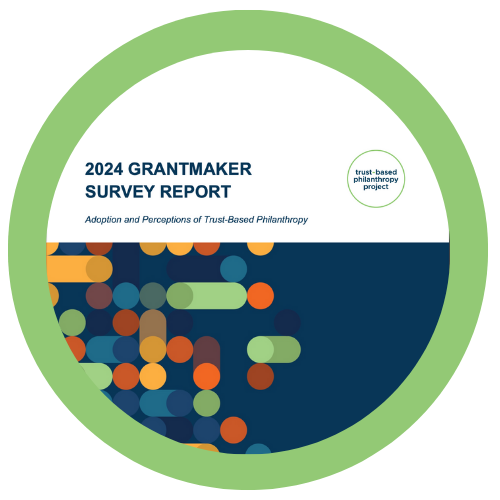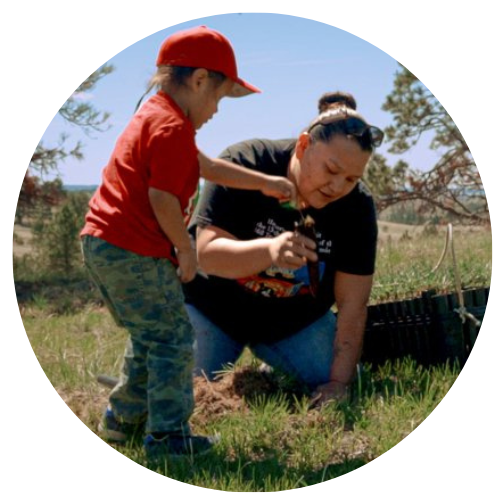Trust-Based Blog
Reimagining philanthropy begins with learning out loud.
By sharing ideas, with curiosity and humility, the Trust-Based Philanthropy Project blog features trust-based grantmakers who talk about their own lessons, questions, and aha-moments along their power-sharing journeys.

Funders, Can Nonprofits Count on You Amid Growing Threats?
Through economics crises, a global pandemic, and hostile administrations, nonprofits have remained steadfast in supporting the communities hit the hardest. Here are five ways funders can show up as trustworthy stewards amid growing threats.

Learning Out Loud: Insights From our 2024 Grantmaker Survey
Dig into our 2024 survey, where 573 grantmakers shared their perspectives on personal motivations for pursuing trust-based philanthropy, how they use terminology, how they’ve shifted to trust-based practices and operations, and what made those changes possible.

Brenda Solórzano on Building a Trust-Based Organization: Reflections on 7 ½ years at Headwaters Foundation
Brenda Solórzano reflects on over 7 years at Headwaters Foundation and what she’s learned about TBP along the way. (Reposted from The Giving Practice at Philanthropy Northwest)

In the Right Hands: A New Documentary on Trust-Based Philanthropy
Last week, Trees, Water & People (TWP) released the short film In The Right Hands - Trusting Community to Guide Philanthropy.

A New Chapter for the TBP Movement
The Trust-Based Philanthropy Project is embarking on a new chapter. As we approach our 5-year anniversary, we are poised to realize our once-radical dream: making trust-based philanthropy the standard of practice for effective, equitable philanthropy. Read more about what the next chapter looks like.

A Field Initiative Built on Trust
Since 2022, Constellations has raised $13M and redistributed over $7.2M to build BIPOC-led narrative and cultural power in regions across the country. Erin Williams and Cinthia Carvajal reflect on the process and share learnings from their network.

Liberating Nonprofits: A Black, Woman Fundraiser's Perspective
In the labyrinth of nonprofit fundraising, Black-led organizations navigate a landscape often obscured by systemic inequities and disparities. Beth Leigh reflects on the glaring disparities in funding allocation and the uphill battle for unrestricted support.

Here’s Why Trust Goes Deeper Than Unrestricted Funding
Several years ago, several nonprofit CEOs in Michigan came up with a big idea: what if they could come together to more intentionally meet the needs of youth and families in their community? Danielle Sielatycki, chief executive officer of Prevention Works shares how trust goes deeper than unrestricted funding.

The Helping Industry’s Role in Alleviating Power Imbalances
While trust-based philanthropy often focuses on the role of grantmakers in alleviating power imbalances. Vendors and consultants play an important role in reinforcing or reimagining harmful practices.

There Is a Trust Gap in Philanthropy. Donors Can Help Close It.
Trust alone won’t build a more equitable and effective nonprofit sector and democratic society. It requires donors to reckon with systemic inequity and their implicit biases.

How Can A Trust-Based Approach Be Applied to Impact-First Investing?
While philanthropy can and often does support nonprofits to create a positive impact, philanthropy also has a track record of unintended negative consequences for the organizations and communities we serve. Stacey Faella, executive director of the Woodcock Foundation shares what it looks like to apply a trust-based approach to impact investing and offers next steps on what funders & investors can do.

Why We Welcome Critique About Trust-Based Philanthropy
While a significant number of grantmakers are actively operationalizing trust-based philanthropy within their organizations, many find friction when it comes to making the case with certain stakeholders. Hearing critiques help us to refine and reiterate our talking points in a way that meets people where they are.

The Future of Philanthropy Is Trust-Based
The perspectives in this supplement with Stanford Social Innovation Review shed light on what trust-based philanthropy all about, and what it looks like in a range of contexts. They reinforce that trust-based philanthropy is highly strategic, deeply relational, and sometimes messy; and that this work is necessary in order to advance a more just and equitable future.

What Critics Are Getting Wrong About Trust-Based Philanthropy
One of the most oversimplified misperceptions of trust-based philanthropy is that it is about giving money with no strings attached. This opens the door for critics to make unfounded claims about trust-based philanthropy as loose, unstrategic, and lacking in accountability and outcomes.

